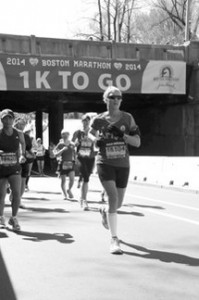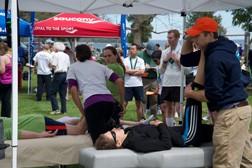Recovery Mode
- Share
- Tweet
- Pin
- Share
It takes a single-minded focus to train to run 13.1 miles, a focus that doesn’t leave a lot of brain space for what comes after the finish line.
The 2,000-plus runners who will run the Door County Half Marathon Saturday have spent countless hours planning and evaluating their training program, but many of them have spent very little time planning for recovery in the days that follow. But a good recovery plan can be the difference between running one half marathon to say you did it, and feeling good enough to continue a life of healthy running and reaping all the rewards that come with it.

Krista Lawell is a marathon veteran who has finished 31 marathons, 10 of which have been the Boston Marathon. Lawell is pictured here nearing the finish of the 2014 Boston Marathon. Submitted photo.
One problem runners face is not really knowing what it means to recover. As Runner’s World columnist and Door County Half Marathon veteran Jenny Hadfield writes, “recovery is more than just resting or running less – it’s eating quality foods; getting in high-quality sleep, flexibility work, or massage; and chilling in general.”
In other words, it’s not just waiting around until you feel better. A good race recovery plan takes the same work and planning that goes into your training – if you want to run again.
Krista Lawell, a veteran of 31 marathons and the pace team coordinator for the Door County Half Marathon, shared some of her best tips for a great post-race recovery.
At the finish line:
The first step in your recovery starts when you cross the finish line. You probably don’t want to hear that, but a little thoughtfulness here can make the days after feel a lot better.
“One of the best things to do following finishing a half or full is to take time to walk a bit, but then get off your feet if you can,” Lawell says. “Also, make sure to hydrate immediately and take in an electrolyte replacement drink or something with a bit of protein. Some people swear by chocolate milk as an excellent recovery drink. My drink of choice would be Thai coconut water (Brazilian coconut water has a strange aftertaste to many people). Easily digestible foods like bananas, pretzels, apples and something with some salt are good choices.”
The first 24 hours:
1. Sleep.
Obviously, but it can’t be stressed enough. Your body needs it every day, and it especially needs it now.

2. Stretch.
This can seem so hard in the hours after a race, and even worse the next morning, but do it. If you have a foam roller use it to work out the adhesions in your fascia and to give yourself a little self-massage. Speaking of which…
3. Get a massage
Wait till the next day, then treat yourself.
“Your leg muscles (and specifically, your quads) essentially have micro-tears that need to heal from a hard run effort,” Lawell says. “Massages can be therapeutic, but typically wait one or two days following a half or full marathon.”
Dos and Don’ts
Do:
• Give yourself a break.
You earned it (and you may not have a choice!).
“After a marathon it generally takes a minimum of two to three weeks for the body to recover from the strain,” Lawell says. “Some experts suggest resting one day for every mile run in the marathon.”
Resting does not mean simply sitting on your butt. One of the best things you can do the day after the race is to go for a walk to loosen up your legs.
“Walking is an excellent, low impact cross-training to ease your muscles back into movement,” Lawell says.
• Get your protein.
After the race and in the first two days to follow, eat protein-rich foods to rebuild and repair your muscles. Steve Yee, founder of the Marathon Maniacs and a veteran of more than 320 marathons (yes, 320) will often run marathons in back-to-back weekends. He says he will eat a big burger or fish after a race, and continue to go heavy on protein for the first half of the week before going back to carbs later in the week.
Don’t:
• Get drunk.
Yes, you should feel like celebrating, and you deserve to, but you’ll do yourself a favor by sticking to just a couple.
“Watch your alcohol intake as many people are dehydrated following an endurance effort like a marathon or half marathon,” Lawell says. “A runner’s nutritional needs are just as important post race as they are pre-race. Nutritional recovery should include plenty of carbohydrates, as they are still your best way to refuel with whole grains, fruits and vegetables key as well as some protein in that mix.”
• Get greedy.
“If you had a great run, don’t think it’s time to push yourself immediately after,” she says. “Let your body recover and rest, which means taking a day or two completely off of running. Don’t do speed work for a couple of weeks. Instead, walk and do some short, easy runs in the week after the race.”
Can I run another race next weekend?
That depends. If you’re like Yee, all you do is race. He once completed 57 marathons in a single year! But for the rest of us it’s best to take a more cautious approach.
“If you ran the half at an easy, comfortable pace as a training run,” Lawell says, “then you might be able to compete in a race a week later if you know you have the basic training for it and it’s a shorter race like a 5k.”
If you raced all out in the half marathon, however, give yourself some time before your next attempt at a good time or a personal best.
By all means, sign up for a race to do it with friends or as a recovery, but don’t expect to race the clock.
“Be respectful of what your body has been through and know yourself,” Lawell says. “If you know it would be hard for you to hold back in a race setting the following week after running hard at the half marathon, maybe volunteer to work for the race that following weekend instead of run it.”
